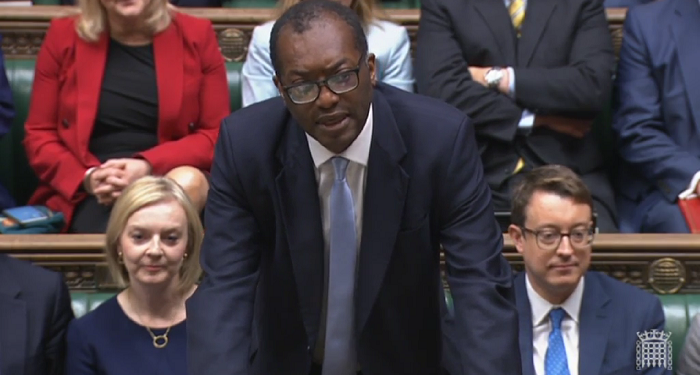Government intends to deliver an “ambitious” deregulatory package later this autumn to “unleash the potential” of the UK financial services sector as part of its plan to drive growth across the UK economy.
Growth Plan 2022 released following chancellor Kwasi Kwarteng’s (pictured centre) mini budget speech reveals the focus on the financial services sector on government plans for growth.
The HM Treasury documents highlight that new Conservative prime minister Liz Truss (pictured left) and Kwarteng are placing a significant amount of reliance on the financial services sector and the City to be the key catalist for the UK economy.
“The financial services sector will be at the heart of the government’s programme for driving growth across the whole economy,” the plan said.
“Later this autumn the government will bring forward an ambitious deregulatory package to unleash the potential of the UK financial services sector.”
The plans will include the repealing of EU law for financial services and replacing it with rules “tailor made” for the UK and scrapping “poorly designed” limits on bankers’ bonuses which it argued “undermine growth and hinder financial stability”.
HM Treasury also reiterated plans revealed earlier this year to slash Solvency II requirements for insurers that dictate how much capital they must hold and the types of assets they can use.
The proposed Solvency II reforms developed by Treasury alongside the Prudential Regulation Authority included a substantial reduction in the risk margin for insurers, including a cut of around 60-70% for long-term life insurers.
Strong financial services sector
Addressing Parliament, chancellor Kwasi Kwarteng said: “To reaffirm the UK’s status as the world’s financial services centre, I will set out an ambitious package of regulatory reforms later in the Autumn.”
The cap on bonuses for senior bankers was brought in by the European Union following the collapse of banks and the need for government bailouts during the financial crisis a decade ago.
It was also introduced with the intention of limiting high risk behaviours that put many of the nation’s biggest financial instiutions at risk of collapse in the future.
Confirming the removal of the cap, Kwarteng added: “A strong UK economy has always depended on a strong financial services sector.
“We need global banks to create jobs here, invest here, and pay taxes here in London, not Paris, not Frankfurt, not New York.
“All the bonus cap did was to push up the basic salaries of bankers, or drive activity outside Europe. It never capped total remuneration, so let’s not sit here and pretend otherwise. So, we’re going to get rid of it.”






